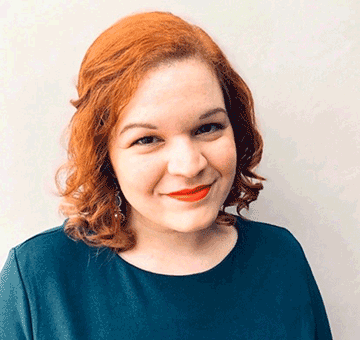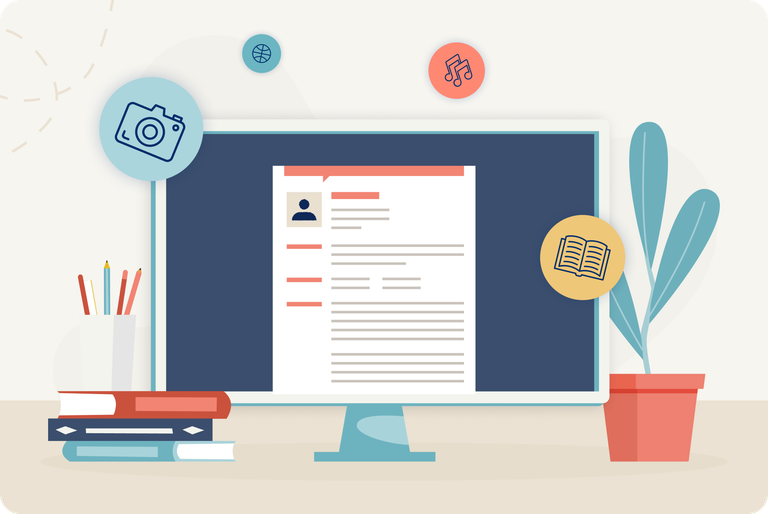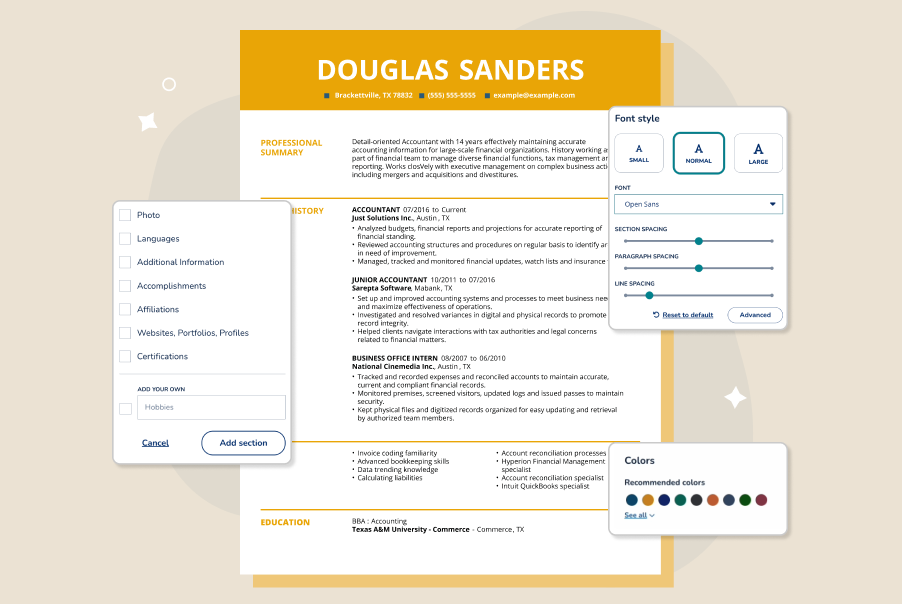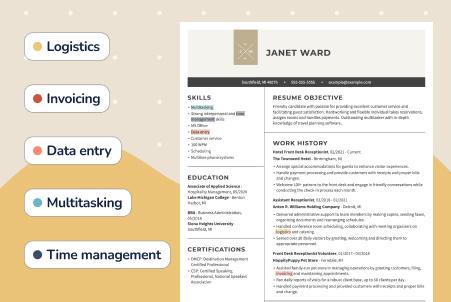40+ Interpersonal Skills & How to Use Them to Get a Job
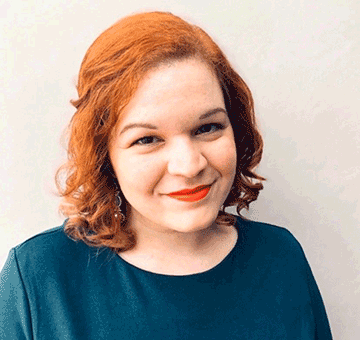
Our customers have been hired at: *Foot Note
AI Resume Skills Generator
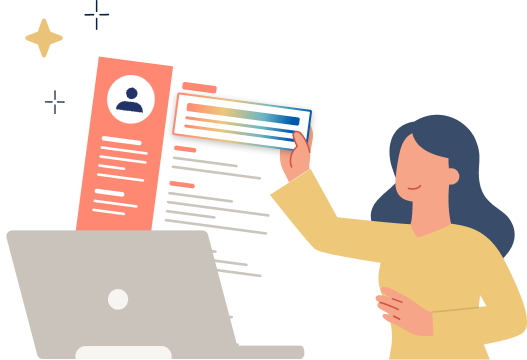
Interpersonal skills, such as active listening, teamwork, collaboration and leadership, are some of the most valuable skills you can have for just about every industry and job title. But what are interpersonal skills, exactly? And how should you highlight them on a resume to get a job?
This guide covers everything you need to know about interpersonal skills, including:
- What are interpersonal skills?
- Why are interpersonal skills important for a job?
- How to list interpersonal skills on a resume.
- How to describe interpersonal skills in a cover letter.
- How to use interpersonal skills in a job interview.
- How to develop interpersonal skills.
Table of Contents
Get started with MyPerfectResume today!
- Build a resume on any device
- Pick an ATS-friendly template
- Tailor with AI copy suggestions
Transform your resume into a work of art with our beautifully designed, professional resume templates.
What are interpersonal skills?
Interpersonal skills — the soft skills we use to interact and work with others — are often called “people skills” because they demonstrate how we communicate and collaborate. From verbal and written communication to conflict management, good interpersonal skills are critical for positive and productive interactions with coworkers, colleagues, managers, clients and customers.
Why are interpersonal skills important for a job?
Interpersonal skills are crucial for success in any job because they help you effectively communicate, collaborate, and build relationships with colleagues, clients and stakeholders. While technical and hard skills are vital to any job, they aren't enough in today’s highly competitive job market.
Potential employers look for job applicants with strong interpersonal skills because they contribute to a positive and collaborative work environment. Honing interpersonal skills helps you to work well in teams, resolve conflicts and navigate challenging situations with empathy and understanding. By demonstrating good interpersonal skills, you show employers that you can create a positive work environment, foster trust and respect, and enhance overall productivity and morale within the organization.
Examples of interpersonal skills
Interpersonal skills are crucial to working with other people, so the more you have the better.
Here are the top interpersonal skills you need to succeed in most jobs:
Communication
Working with others requires clear and effective verbal and written expression. Because almost every job involves working with others to some degree and strong communication skills, this is a top requirement for most hiring managers.
Communication skills include:
- Written and verbal communication
- Active listening
- Persuasion
- Presentation
Conflict resolution
Whether it’s diffusing disagreements, getting different departments to agree on priorities or outcomes, or helping people reach satisfactory compromises, the ability to resolve conflicts is a valuable interpersonal skill — especially if you are a people manager.
Conflict resolution skills include:
- Counseling
- Mediation
- Negotiation
- Constructive criticism
Collaboration
Whether you’re working in an office or remotely, hiring managers want to know that you can cooperate and work with colleagues toward a common goal. Traits like flexibility and a positive attitude speak to your ability to collaborate effectively.
Collaboration skills include:
- Teamwork
- Team building
- Accountability
- Relationship management
Leadership
You don’t have to be a manager to have great leadership skills. Inspiring and encouraging teammates and colleagues are valuable examples of interpersonal skills because they guide teams and projects to successful outcomes.
Leadership skills include:
- Mentorship
- Supervision
- Proactivity
- Motivation
Compassion
Most hiring managers for jobs that require dealing with others directly, like retail sales, food and beverage service and customer service, place traits like compassion at a premium because they want job candidates who can understand and relate to people.
Compassion includes:
- Kindness
- Patience
- Respect
- Diplomacy
Problem-solving
Strong interpersonal problem-solving abilities help teams overcome challenges and find creative solutions together. This skill is especially valuable when working on complex projects or in fast-paced environments where issues need to be resolved collaboratively.
Problem-solving includes:
- Critical thinking
- Analysis
- Decision-making
- Adaptability
Interpersonal skills serve as the cornerstone of professional success, regardless of the job. While technical expertise gets you in the door, it is your ability to connect with others, empathize and navigate complex social dynamics that trul sets you apart. — Ben Richardson, Founder & Director of Acuity Training
Examples of interpersonal skills for top jobs
The vast majority of jobs in every industry involve working with others, and that’s why having some of the most desirable interpersonal skills for each position can separate you from other job candidates.
Here is a list of interpersonal skills for various jobs:
Hospitality:
- Listening
- Tactfulness
- Flexibility
- Communication
- Open-mindedness
- Teamwork
See also: Top hospitality resume examples
Events:
- Communication
- Cultural awareness
- Collaboration
- Negotiation
- Patience
- Relationship building
See also: Top events resume examples
Nursing:
- Ethics
- Patience
- Compassion
- Cultural awareness
- Respect
- Sensitivity
See also: Top nursing resume examples
Sales:
- Leadership
- Persuasion
- Speaking
- Presentation
- Listening
- Trustworthiness
See also: Top sales resume examples
Health care support:
- Adaptability
- Empathy
- Respect
- Teamwork
- Active listening
- Understanding
See also: Top health care support resume examples
Human resources:
- Diplomacy
- Relationship building
- Tolerance
- Cultural sensitivity
- Leadership
- Ethics
See also: Top human resources resume examples
Social services:
- Active listening
- Compassion
- Patience
- Diplomacy
- Cultural competence
- Trustworthiness
See also: Top social services resume examples
Customer service:
- Listening skills
- Conflict resolution
- Patience
- Assertiveness
- Nonverbal communication
- Tactfulness
See also: Top customer service resume examples
Teacher:
- Speaking
- Assertiveness
- Patience
- Leadership
- Self-awareness
- Cultural sensitivity
See also: Top teacher resume examples
Restaurant manager:
- Leadership
- Verbal communication
- Conflict resolution
- Ethics
- Patience
- Relationship management
Se also: Top restaurant manager resume examples
Doctor:
- Compassion
- Positivity
- Tactfulness
- Sensitivty
- Cultural awareness
- Active listening
See also: Top doctor resume examples
Make a resume with MyPerfectResume
Our Resume builder can help you write the perfect resume. Start Now!
How to highlight your interpersonal skills on a resume
Highlighting your interpersonal skills on your resume can set you apart from other job candidates and demonstrate your ability to communicate, collaborate and build relationships successfully.
Let’s explore practical strategies and examples to help you effectively highlight your interpersonal skills in each section of your resume to stand out to potential employers.
Pro tip
Use the job description as your guide when deciding which interpersonal skills to display on your resume.
How to add interpersonal skills to your resume summary
Emphasizing relevant interpersonal skills in your resume summary or objective statement is a great way to grab potential employers’ attention immediately.
Examples of interpersonal skills in a resume summary:
- “Sales assistant with two years of experience in direct sales. Works directly with customers and representatives on sales quotations, status calls, deliveries and service. Assists in various customer service projects as needed.”
- “Entry-level health care support specialist motivated to work in a team environment to collaborate on high-level customer care initiatives.”
Examples of interpersonal skills for your resume work history
When adding workplace interpersonal skills to your job history section, feature examples that demonstrate that you have the right skills and know how to use them. Show your impact on the company by incorporating numbers into your accomplishment descriptions.
Examples of interpersonal skills in a work history section:
- Answered 50 calls per day while assisting an average of 100 customers per week.
- Collaborated with a team of 10 sales representatives on goal-setting.
- Won an award for building sustainable relationships and trust with customers and representatives through active listening and direct communication.
How to list interpersonal skills in the skills section of your resume
Use bullet points to list your interpersonal skills and other relevant soft, hard, technical and computer skills. A good strategy to make skill sets stand out is to create subcategories for each type of skill you want to list.
You could arrange your resume skills section like this, for example:
Key skills
Interpersonal skills
- Collaboration
- Compassion
- Active listening
- Relationship building
Computer skills
- Data entry
- Microsoft Excel
- Project management software
- Internet research
How to put interpersonal skills in your resume education section
You can highlight your interpersonal skills in the education section of your resume by including relevant coursework or projects that require collaboration, communication, and teamwork. For example, you can mention group projects where you successfully worked with classmates to achieve a common goal, demonstrating your ability to effectively communicate ideas, delegate tasks, and resolve conflicts. Additionally, you can showcase any leadership roles you held in student organizations or extracurricular activities, emphasizing your ability to motivate and inspire others and your strong interpersonal skills in managing and coordinating group activities.
For example,
Temple University, Philadelphia, PA
Bachelor of Arts, Psychology
September 2017 - May 2023
- Completed coursework in interpersonal communication, conflict resolution and group dynamics.
- Participated in group projects and presentations, demonstrating strong teamwork and collaboration skills.
- Conducted research projects requiring effective communication with peers and professors.
- Engaged in discussions and debates on various psychological theories, showcasing active listening and critical thinking abilities.
Did you know?
Compared to technical or hard skills, interpersonal skills in the workplace can transfer across jobs. Empathy, for example, is essential to working well with others, whether you are a back-end developer, customer service manager or bartender.
How to describe interpersonal skills in a cover letter
Cover letters are essential to any job application. Pair one with your resume to provide more details on important skills and experiences and to give insight into your personality.
When writing your cover letter, elaborate on one or two interpersonal skills from your resume, focusing on those that match the job requirements well. Explain in detail how you used them and their positive impact on the company.
Example of interpersonal skills in a cover letter
“In my current position as marketing manager, I collaborate with multiple stakeholders across a 200-employee organization, rallying teams and motivating my direct reports to deliver on campaign targets. I’m comfortable wearing different hats to ensure successful product launches and sales. Customer satisfaction is my No. 1 goal.”
Notice how the job applicant added a variety of key interpersonal skills to this short paragraph: leadership (managing products and campaigns; motivating and rallying others), collaboration (working with other stakeholders) and customer service (ensuring consumer satisfaction).
How to use interpersonal skills in a job interview
If you’ve made it this far in the job application process, you’ve likely done a good job showcasing your interpersonal skills in your job application. Now it’s time to put those great interpersonal skills to work.
Here’s how to showcase examples of interpersonal skills in a job interview.
- Be prepared with the right examples. As with your cover letter, focus on one or two of your greatest accomplishments where you used workplace interpersonal skills to achieve your goal and be prepared to discuss it. For example, “As a teacher, it’s important to me to create a supportive and engaging classroom environment where students feel valued and motivated to learn. By actively listening to my students, showing empathy, and fostering open communication, I have built strong relationships with them based on trust and respect. This has allowed me to effectively address individual learning needs, provide personalized support, and create a sense of belonging within the classroom community.”
- Establish a connection. If you’re meeting face-to-face or over video, put your interpersonal skills on display to make a positive impression on your interviewer. For example, maintain eye contact with the camera to simulate direct eye contact with the person you are talking to and display an engaging and positive demeanor. Build rapport with your interviewer by using active listening skills such as nodding and responding with interest and enthusiasm to show understanding when your interviewer speaks.
- Ask thoughtful questions. Asking relevant questions for clarification in a job interview demonstrates curiosity, the ability to effectively engage with your interviewer, and a genuine desire to learn more about the company and the position.
To display your interpersonal skills, you might ask questions like:
- Can you tell me more about the team dynamics and how collaboration is encouraged within the organization?
- How does the company support professional development and growth opportunities for employees?
- What qualities are essential for someone to succeed in this role and within the company culture?
- How does the company promote diversity and inclusion in the workplace?
- Can you provide examples of successful projects that required strong teamwork and communication skills within the team?
- How does the company handle conflicts or challenges that arise in the workplace, and how are they resolved?
- What opportunities are there for employees to give and receive feedback to support their professional development?
- How does the company prioritize employee well-being and work-life balance?
How interpersonal skills can advance your career
Having strong interpersonal skills can significantly boost your chances for advancing in your career because they pave the way for expanded networking opportunities, contribute to leadership development, and help you build meaningful work relationships.
Here’s how:
- By being able to effectively communicate, collaborate and connect with others, you open the doors to new networking opportunities.
- Being a good listener shows that you value others' opinions and input, create a positive and collaborative work environment, and build strong relationships with colleagues along the way.
- Being able to motivate, inspire and encourage others allows you to develop a reputation for being a respected leader in your field.
How to develop interpersonal skills
Developing strong interpersonal skills is essential for success in both personal and professional settings. By honing these skills, you can improve communication, build better relationships, and confidently navigate social interactions.
Here are 10 key strategies to help you develop and improve your interpersonal skills.
- Practice active listening: Focus on understanding others rather than just waiting for your turn to speak.
- Improve communication skills: Work on expressing yourself clearly and effectively, both verbally and nonverbally.
- Cultivate empathy: Put yourself in others' shoes and try to understand their perspectives and emotions.
- Seek feedback: Ask for constructive feedback from others to identify areas for improvement in your interpersonal skills.
- Participate in group activities: Engage in team projects or group discussions to enhance your collaboration and teamwork skills.
- Develop emotional intelligence: Learn to manage your emotions and understand the emotions of others in various situations.
- Attend workshops or training sessions: Take advantage of opportunities to learn and practice interpersonal skills in a structured setting.
- Reflect on your interactions: Regularly reflect on your social interactions to identify areas where you can improve and grow.
- Build relationships: Invest time and effort in building and maintaining positive relationships with others in your personal and professional life.
- Stay open-minded: Be willing to consider different perspectives and be adaptable in your communication and interactions.
Key takeaways
Now that you’re up to speed on interpersonal skills and how to use them, it’s time to use them to get the job. Review these important takeaways from this article as you prepare your job application.
- Workplace interpersonal skills are soft skills we use to interact and work with others. They show how well we communicate to get things done in the workplace.
- Always match your skills to the requirements listed in the job description.
- Top examples of people skills for most jobs include collaboration, conflict resolution, verbal and nonverbal communication, compassion and listening.
- Add examples of interpersonal skills to your summary, work history and skills sections in your resume.
- Use your cover letter to elaborate on the skills you list on your resume.
- Display your interpersonal skills when interacting with potential employers during job interviews.
FAQ
Which of the various interpersonal skills is most important?
All interpersonal skills are important, but some are more important than others, depending on the job. For example, teachers rely heavily on communication to get knowledge across to students, while nurses need to have active listening skills in order to be most effective at their jobs.
How do interpersonal skills help leaders to be most effective?
Interpersonal skills are crucial in enhancing a leader’s effectiveness in several ways. First and foremost, these skills enable leaders to communicate clearly, build trust and foster positive relationships with their team members. By effectively listening and empathizing with others, leaders can better understand their team’s needs and motivations, leading to improved collaboration and productivity.
How do you define interpersonal skills?
Interpersonal skills refer to the ability to effectively communicate, interact and collaborate with others in various social and professional settings. These skills involve empathy, active listening, conflict resolution and teamwork. Having strong interpersonal skills allows individuals to build positive relationships, navigate conflicts and work well in team environments. It also involves understanding and adapting to different communication styles, expressing thoughts and ideas clearly, and showing respect and consideration for others. Developing your interpersonal skills can help you succeed in both your personal and professional life, as it plays a crucial role in building strong connections and fostering productive interactions.
How we reviewed this article
Since 2012, we have helped more than 11 million job seekers. We want to make your career journey accessible and manageable through our services and Career Center’s how-to guides and tips. In our commitment to bring you a transparent process, we present our Editorial Process.
Sources
- Richardson, Ben. Founder & Director. Personal Interview. Acuity Training
- Recruiting News Network. Article. Cardenas, Heidi. Interpersonal Skills: How to Assess Them in Recruitment
- Robert Half. Article. 11 Top Recruiters Share the Skills They Look for When Hiring
- U.S. News and World Report. Blog. Crawford, Hallie. How to Highlight Interpersonal Skills in Interviews and Resumes
Our customers have been hired at:*Foot Note

